| Back |
The Carolinas Campaign
Death To All Foragers
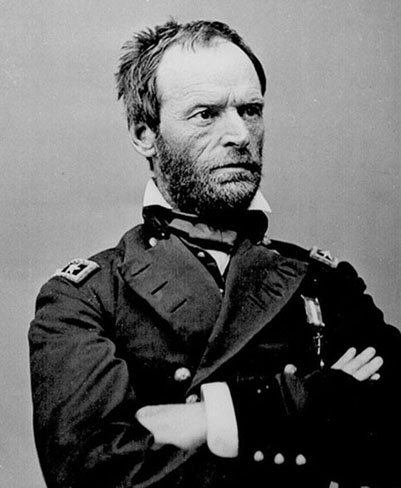 Sherman |
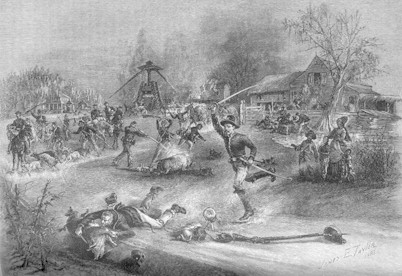 Sherman' Bummers |
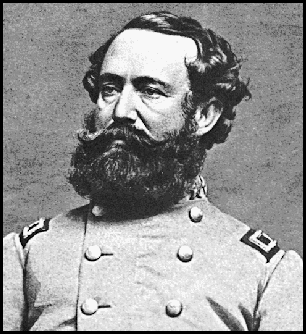 Hampton |
Gen. Sherman's concept of "Total War" included acts of violance on not only the property of private citizens but also on their persons. To feed and provide for his vast army marching to the sea and through hated South Carolina, Sherman ordered the use of foragers know as "Sherman's Bummers". Faced with this unpresidented abuse of civilians, some bummers when caught were summerally hung as thieves, murderers and arsonists.
Almost all Federals allegedly lynched by Confederate troops were what were termed "Bummers" or foragers of Sherman's army. It was these bummers who did nearly all of the atrocities that the Federal army was accused of by the Confederates.
The Official Records cites that 46 Federals were reported lynched by Confederate troops. The majority of these incidents occured above Columbia. Also the lynchings were reportedly done exclusivly by Confederate Cavalry. Interestingly enough, the acts happened almost exclusivly when Lt. General Wade Hampton and Major General Matt C. Butler came into contact with Federal columns in mid February 1865. These two men, both natives of South Carolina, would be less passive to a Federal army destroying their home state.
Many Confederate officers, (particulary those from South Carolina), saw the shooting down of foragers caught in the act as a way of deterring their actions in the future.
Heated exchanges occured between Union and Confederate leaders concerning this situation, for example this sharp debate between Maj. Gen.Sherman and Lt. General Wade Hampton regarding such alleged policies.
In the Field, February 24, 1865.
Lieut. Gen. WADE HAMPTON,
Commanding Cavalry Forces, C. S. Army:
GENERAL: It is officially reported to me that our foraging parties are murdered after capture and labeled "Death to all foragers." One instance of a lieutenant and seven men near Chesterville; and another of twenty "near a ravine eighty rods from the main road" about three miles from Feasterville. I have ordered a similar number of prisoners in our hands to be disposed of in like manner. I hold about 1,000 prisoners captured in various ways, and can stand it as long as you; but I hardly think these murders are committed with your knowledge, and would suggest that you give notice to the people at large that every life taken by them simply results in the death of one of your Confederates. Of course you cannot question my right to "forage on the country." It is a war right as old as history. The manner of exercising it varies with circumstances, and if the civil authorities will supply my requisitions I will forbid all foraging. But I find no civil authorities who can respond to calls for forage or provisions, therefore must collect directly of the people. I have no doubt this is the occasion of much misbehavior on the part of our men, but I cannot permit an enemy to judge or punish with wholesale murder. Personally I regret the bitter feelings engendered by this war, but they were to be expected, and I simply allege that those who struck the first blow and made war inevitable ought not, in fairness, to reproach us for the natural consequences. I merely assert our war right to forage and my resolve to protect my foragers to the extent of life for life.
I am, with respect, your obedient servant,
W. T. SHERMAN,
Major-General, U.S. Army.
To which Hampton replied:
In the Field, February 27, 1865.
Maj. Gen. W. T. SHERMAN, U.S. Army:
In reference to the statement you make regarding the death of your foragers, I have only to say that I know nothing of it; that no orders given by me authorize the killing of prisoners after capture, and that do not believe my men killed any of yours, except under circumstances in which it was perfectly legitimate and proper that they should kill them. It is a part of the system of the thieves whom you designate as your foragers to fire the dwellings of those citizens whom they have robbed. To check this inhuman system, which is justly execrated by every civilized nation, I have directed my men to shoot down all of your men who are caught burning houses. This order shall remain in force so long as you disgrace the profession of arms by allowing your men to destroy private dwellings.
You say that I cannot, of course, question your right to forage on the country--"It is a right as old as history." I do not sir, question this right. But there is a right older, even, than this, and one more inalienable--the right that every man has to defend his home and to protect those who are dependent on him; and from my heart I wish that every old man and boy in my country who can fire a gun would shoot down, as he would a wild beast, the men who are desolating their land, burning their homes, and insulting their women.
You are particular in defining and claiming "war rights." May I ask if you enumerate among these the right to fire upon a defenseless city without notice; to burn that city to the ground after it had been surrendered by the inhabitants who claimed, though in vain, that protection which is always accorded in civilized warfare to non-combatants; to fire the dwelling houses of citizens after robbing them; and to perpetrate even darker crimes than these crimes too black to be mentioned?
You have permitted, if you have not ordered, the commission of these offenses against humanity and the rules of war; you fired into the city of Columbia without a word of warning; after its surrender by the mayor, who demanded protection to private property, you laid the whole city in ashes, leaving amidst its ruins thousands of old men and helpless women and children, who are likely to perish of starvation and exposure. Your line of march can be traced by the lurid light of burning houses, and in more than one household there is now an agony far more bitter than that of death. The Indian scalped his victim regardless of age or sex, but with all his barbarity he always respected the persons of his female captives. Your soldiers, more savage than the lndian, insult those whose natural protectors are absent.
In conclusion, I have only to request that whenever you have any of my men "murdered" or "disposed of," for the terms appear to be synonymous with you, you will let me hear of it, that I may know what action to take in the matter. In the meantime I shall hold fifty-six of your men as hostages for those whom you have ordered to be executed.
I am, yours, &c.,
WADE HAMPTON,
Lieutenant-General.
A very interesting letter from Sherman to one of his Generals illustrates his views on this heated time.
He (General Kilpatrick) reports that two men of his foraging parties were murdered after capture by the enemy and labeled "Death to all foragers." Now, it is clearly our war right to subsist our army on the enemy. Napoleon always did it, but could avail himself of the civil powers he found in existence to collect forage and provisions by regular impressments. We cannot do that here, and I contend if the enemy fails to defend his country we may rightfully appropriate what we want. If our foragers act under mine, yours, or other proper authority, they must be protected. I have ordered Kilpatrick to select of his prisoners man for man, shoot them, and leave them by the roadside labeled, so that our enemy will see that for every man he executes he takes the life of one of his own. I want the foragers, however, to be kept within reasonable bounds for the sake of discipline. I will not protect them when they enter dwellings and commit wanton waste, such as woman's apparel, jewelry, and such things as are not needed by our army. They may destroy cotton and tobacco, because these things are assumed by the rebel Government to belong to it, and are used as a valuable source of revenue. Nor will I consent to the enemy taking the lives of our men on their judgment. They have lost all title to property and can lose nothing not already forfeited, but we should punish for a departure from orders, and if the people resist our foragers I will not deem it wrong, but the Confederate army must not be supposed the champions of any people. I lay down these general rules and wish you to be governed by them. If any of your foragers are murdered, take life for life, leaving a record of each case.
Bentonville.
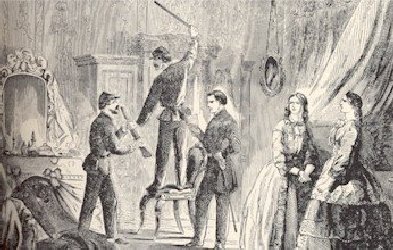 Bummers ransacking a home |
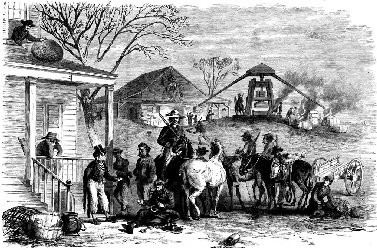 Bummers stealing food stuffs |
A Southern View
A Northern View
HOME
What's New -
About SCV -
Join SCV -
Legionary -
Chaplain -
Education
B. F. C. Site -
Ancestors -
Memorials -
Links -
Photo Gallery -
Guest Book -
Site Index